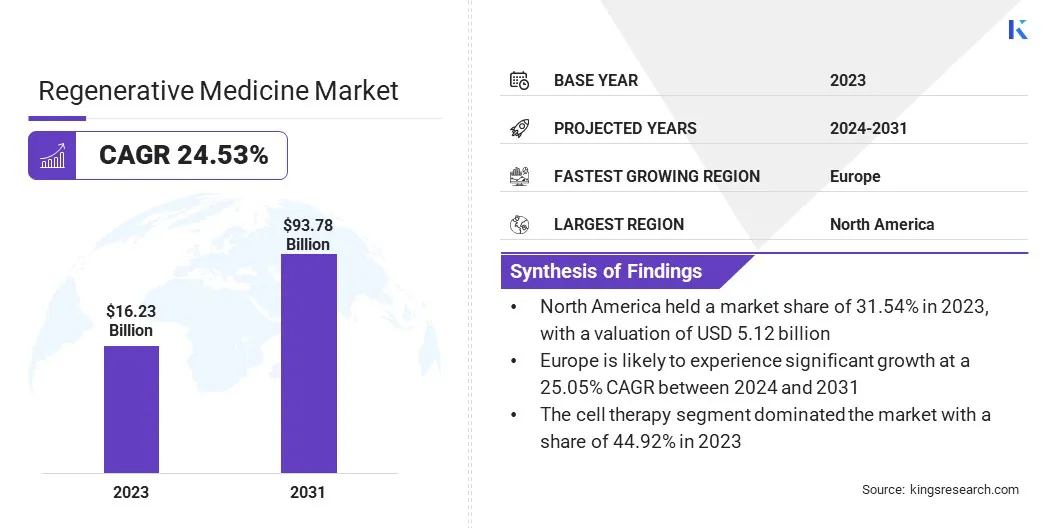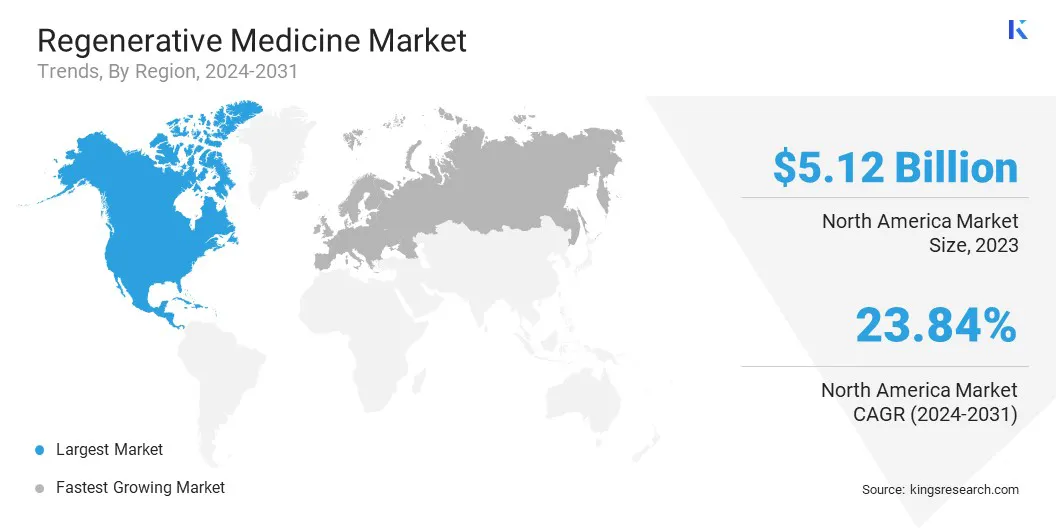Regenerative Medicine Market Size
The global Regenerative Medicine Market size was valued at USD 16.23 billion in 2023 and is projected to reach USD 93.78 billion by 2031, growing at a CAGR of 24.53% from 2024 to 2031. In the scope of work, the report includes products offered by companies such as RTI Surgical, Bristol-Myers Squibb Company, Tissue Regenix, Hoffmann-La Roche Ltd, Smith+Nephew, Bayer AG, MIMEDX Group, Inc., Novartis AG, AstraZeneca, AbbVie, Gilead Sciences, Inc., Johnson & Johnson, INTEGRA LIFESCIENCES and others.
The escalating burden of chronic conditions, such as cardiovascular diseases, diabetes, and degenerative disorders, is significantly driving the demand for innovative regenerative therapies. These chronic conditions pose substantial challenges to healthcare systems worldwide, leading to increased morbidity, mortality, and healthcare costs.
Moreover, there is a growing emphasis on regenerative therapies that can restore functionality and improve the quality of life for patients with chronic conditions. This demand is expected to continue to rise due to increasing prevalence of chronic diseases globally, highlighting the critical role of regenerative medicine in addressing healthcare challenges.
Regenerative medicine refers to encompasses a broad range of therapies and applications aimed at repairing, replacing, or regenerating damaged tissues and organs within the body. These therapies utilize various approaches, including stem cell therapy, tissue engineering, and growth factor administration, to stimulate the body's natural healing processes. Stem cell therapy, for instance, involves the transplantation of stem cells or their derivatives into damaged tissues to promote tissue repair and regeneration.
Moreover, tissue engineering techniques involve the fabrication of artificial tissues and organs using scaffolds and cells derived from the patient or other sources. Regenerative medicine holds immense potential across numerous medical specialties, including cardiology, orthopedics, neurology, and oncology.
Its applications range from treating acute injuries and degenerative diseases to enhancing wound healing and improving organ function. As research and technology continue to advance, the scope and efficacy of regenerative medicine are projected to expand.

Analyst’s Review
The outlook of the regenerative medicine market is characterized by rapid growth and immense potential for innovation. The market is witnessing a surge in research and development activities aimed at developing novel therapies and technologies to address various medical conditions. Stem cell therapy, tissue engineering, and gene editing techniques are among the key areas of focus within the regenerative medicine field.
Moreover, collaborations between academic institutions, biotechnology companies, and healthcare organizations are facilitating the translation of research findings into clinical applications. The regenerative medicine market is projected to experience significant growth in the coming years, fueled by factors such as the increasing prevalence of chronic diseases, technological advancements, and favorable regulatory policies.
Regenerative Medicine Market Growth Factors
Continuous advancements in stem cell research and tissue engineering techniques are playing a pivotal role in fueling the expansion of the regenerative medicine market. Stem cells, with their unique ability to differentiate into various cell types, hold immense potential for regenerating damaged tissues and organs. Researchers are making significant strides in understanding the biology of stem cells, optimizing their isolation and culture methods, and exploring new sources of stem cells.
Additionally, tissue engineering techniques are evolving to create complex three-dimensional structures that mimic native tissues and organs. These advancements are enabling the development of innovative regenerative therapies with improved efficacy and safety profiles.
Moreover, interdisciplinary collaborations between scientists, engineers, and clinicians are fostering innovation and accelerating the translation of research findings into clinical applications. The regenerative medicine market is witnessing a proliferation of novel therapies and products aimed at addressing various medical conditions, thereby propelling market expansion.
High treatment costs and inadequate reimbursement policies pose significant challenges to the growth of the regenerative medicine market. The development and implementation of regenerative therapies often involve substantial research and manufacturing expenses, leading to high treatment costs.
Additionally, the complexity of these therapies, coupled with limited reimbursement coverage by healthcare payers, exacerbates the financial burden on patients and healthcare systems. Inadequate reimbursement policies may result in limited access to regenerative treatments, particularly for patients from underserved populations or those without adequate insurance coverage.
Furthermore, the lack of standardized reimbursement mechanisms for regenerative medicine procedures hampers market growth by deterring investment in research and development and hindering the widespread adoption of these innovative therapies.
To addressing these challenges, stakeholders across the healthcare ecosystem are concentrating on collaborative efforts to establish transparent reimbursement frameworks and improve the affordability and accessibility of regenerative treatments.
Regenerative Medicine Market Trends
The increasing adoption of personalized treatment strategies tailored to individual patient needs represents a significant trend in the regenerative medicine market. Regenerative medicine, with its focus on utilizing the body's natural healing mechanisms offers the potential for personalized therapies that consider several factors such as genetics, immune profile, and disease stage.
By leveraging advances in genomics, bioinformatics, and biomarker discovery, healthcare providers are tailoring regenerative treatments to target specific disease pathways and optimize therapeutic outcomes.
Personalized regenerative therapies enhance treatment efficacy, minimize adverse effects, and improve patient satisfaction. Moreover, the shift toward personalized medicine aligns with the broader trend toward precision medicine, which emphasizes the importance of tailored interventions to achieve improved clinical outcomes and patient-centered care.
Segmentation Analysis
The global regenerative medicine market is segmented based on product, application, and geography.
By Product
Based on product, the market is segmented into cell therapy, gene therapy, tissue engineering, and others. The cell therapy segment dominated the market with a share of 44.92% in 2023 on account of its versatility and therapeutic potential. Cell therapy involves the transplantation or manipulation of cells to restore tissue function or repair damaged organs.
Stem cells, in particular, hold immense promise in regenerative medicine due to their ability to differentiate into various cell types and regenerate damaged tissues. Cell therapies are utilized across a wide range of medical specialties, including oncology, cardiology, and neurology, thereby establishing themselves as a fundamental component of regenerative medicine.
Additionally, ongoing research efforts and technological advancements are continuously expanding the applications of cell therapy, thereby contributing to its dominance in the market.
By Application
Based on application, the market is classified into musculoskeletal, cancer, dermatology & wound care, cardiovascular disease, eye disorders, and others. The cancer segment is anticipated to witness the highest CAGR of 28.27% over the forecast period as a result of the increasing focus on immunotherapy and targeted therapies in oncology.
Cancer remains a significant global health challenge, prompting the need for innovative treatment approaches that offer improved efficacy and fewer side effects compared to conventional therapies.
Regenerative medicine, particularly cell-based immunotherapies, and gene therapies, shows promise in enhancing the body's immune response against cancer cells and targeting specific molecular pathways involved in tumor growth.
Furthermore, the growing prevalence of cancer, coupled with advancements in biomarker discovery and patient stratification, is leading to the development of personalized cancer treatments that tailor therapies based on individual patients' genetic profiles and tumor characteristics. These factors are expected to fuel the growth of the cancer segment within the regenerative medicine market in the coming years.
Regenerative Medicine Market Regional Analysis
Based on region, the global regenerative medicine market is classified into North America, Europe, Asia Pacific, MEA, and Latin America.

The North America Regenerative Medicine Market share stood around 31.54% in 2023 in the global market, with a valuation of USD 5.12 billion due to its robust healthcare infrastructure, technological advancements, and prominent research and development activities in regenerative medicine. The region boasts a strong presence of leading biotechnology companies, academic institutions, and healthcare facilities, which is supporting innovation and fostering collaborations in the field of regenerative medicine.
Moreover, favorable regulatory policies and supportive reimbursement frameworks contribute to the widespread adoption of regenerative therapies in North America. The region's dominance in the regenerative medicine market is further bolstered by increasing investments in healthcare and the rising prevalence of chronic diseases, thereby bolstering demand for innovative treatment options.
Europe is likely to experience significant growth at a 25.05% CAGR between 2024 and 2031 owing to a well-established healthcare infrastructure, skilled workforce, and strong regulatory framework conducive to the development and commercialization of regenerative medicine products. Additionally, Europe has a robust research ecosystem with renowned academic institutions and biotechnology hubs that propel innovation in regenerative therapies.
Furthermore, increasing investments in biotechnology and healthcare, along with rising awareness regarding the potential of regenerative medicine, is expected to fuel regional market growth. Moreover, collaborations between industry stakeholders and government initiatives aimed at promoting research and development in regenerative medicine are likely to facilitate regional market expansion.
Competitive Landscape
The global regenerative medicine market study will provide valuable insight with an emphasis on the fragmented nature of the industry. Prominent players are focusing on several key business strategies such as partnerships, mergers and acquisitions, product innovations, and joint ventures to expand their product portfolio and increase their market shares across different regions.
Expansion & investments are the major strategic initiatives adopted by companies in this sector. Industry players are investing extensively in R&D activities, building new manufacturing facilities, and supply chain optimization.
List of Key Companies in Regenerative Medicine Market
- RTI Surgical
- Bristol-Myers Squibb Company
- Tissue Regenix
- Hoffmann-La Roche Ltd
- Smith+Nephew
- Bayer AG
- MIMEDX Group, Inc.
- Novartis AG
- AstraZeneca
- AbbVie
- Gilead Sciences, Inc.
- Johnson & Johnson
- INTEGRA LIFESCIENCES
Key Industry Developments
- January 2024 (Acquisition): RTI Surgical acquired Cook Biotech Incorporated with the aim of strengthening the regenerative medicine industry and positioning the combined entity as the sole provider of a diverse portfolio of allograft and xenograft biomaterials on a large scale.
- November 2023 (Collaborated):
- Kite, a subsidiary of Gilead Sciences, partnered with Arcellx, Inc., to secure a licensing agreement for Arcellx’s ARC-SparX program, ACLX-001 with the intention of addressing multiple myeloma. This program involves ARC-T cells and SparX proteins targeting BCMA. Additionally, the collaboration extended to include Arcellx’s CART-ddBCMA for lymphomas.
- AstraZeneca disclosed a collaboration and investment deal with Cellectis, a clinical-stage biotechnology firm. This collaboration aims to expedite the advancement of next-generation therapeutics in areas of significant unmet need, such as oncology, immunology, and rare diseases. This partnership involved utilizing Cellectis' proprietary gene editing technologies and manufacturing capabilities, which design innovative cell and gene therapy products, enhancing AstraZeneca's expanding portfolio in this domain.
- May 2023 (Expansion): Integra LifeSciences Holdings Corporation held a ribbon-cutting ceremony on May 11, 2023, marking the grand opening of its latest innovation and learning center in Plainsboro, New Jersey. This emphasized the company's dedication to deliver advanced regenerative technologies.
- July 2022 (Expansion): MiMedx Group announced the establishment of a Regenerative Medicine Scientific Advisory Board (RMSAB) to offer insights into the company's regenerative medicine clinical pipeline endeavors and to bolster its focus on placental biologics innovation.
The Global Regenerative Medicine Market is Segmented as:
By Product
- Cell Therapy
- Gene Therapy
- Tissue Engineering
- Others
By Application
- Musculoskeletal
- Cancer
- Dermatology & Wound Care
- Cardiovascular Disease
- Eye Disorders
- Others
By Region
- North America
- Europe
- France
- U.K.
- Spain
- Germany
- Italy
- Russia
- Rest of Europe
- Asia-Pacific
- China
- Japan
- India
- South Korea
- Rest of Asia-Pacific
- Middle East & Africa
- GCC
- North Africa
- South Africa
- Rest of Middle East & Africa
- Latin America
- Brazil
- Argentina
- Rest of Latin America


